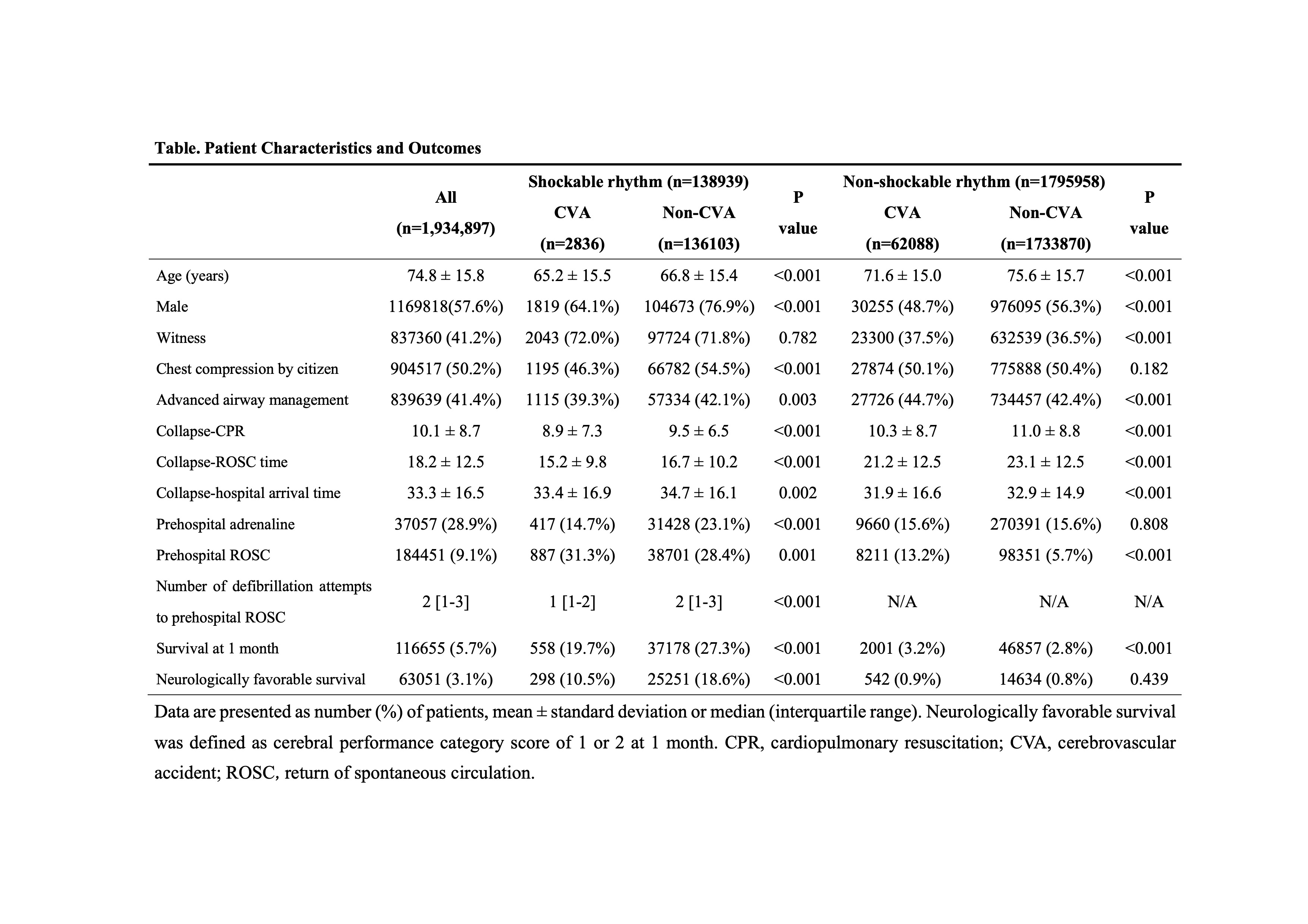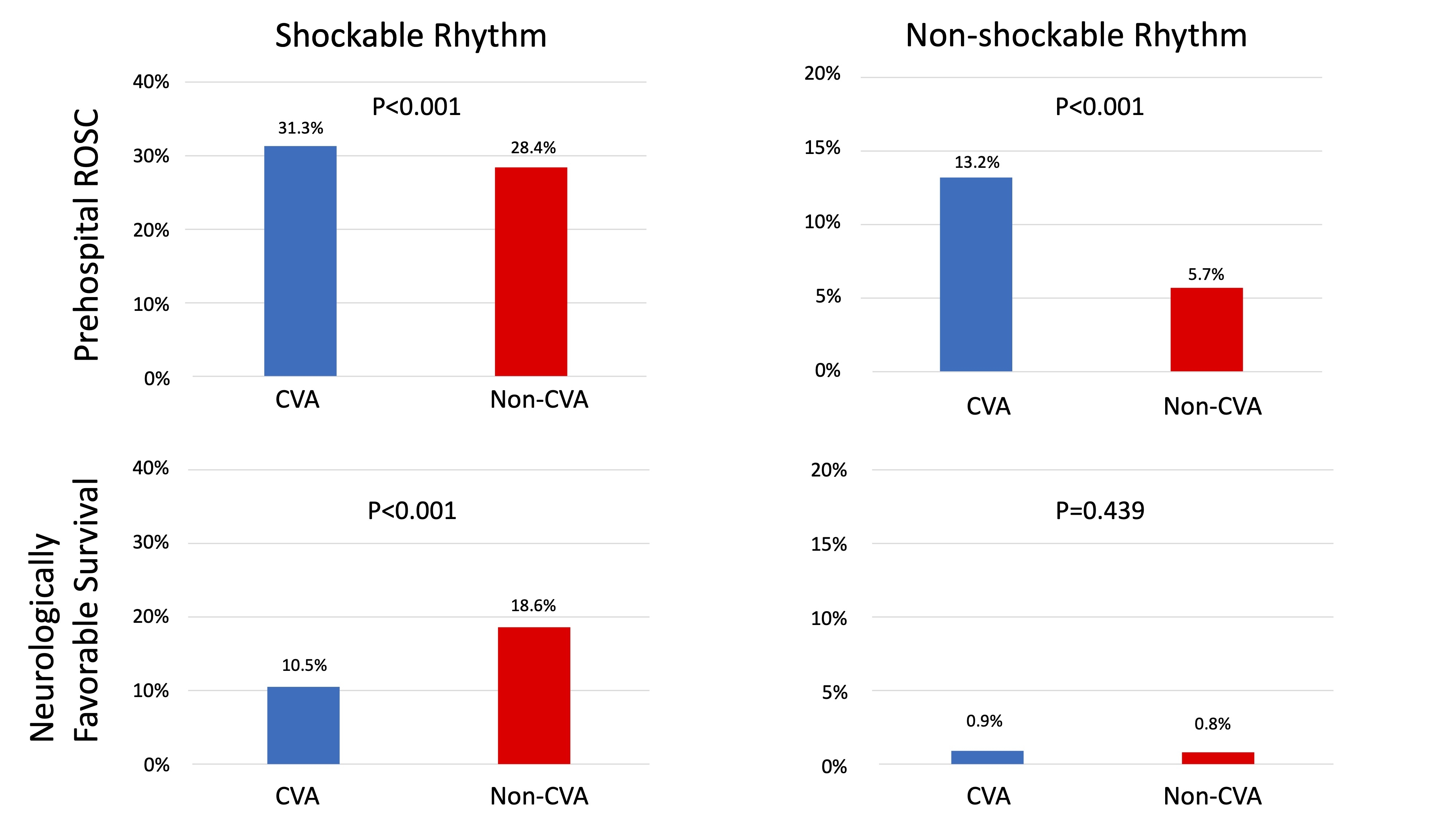Final ID: Sa905
Differential Outcomes After Cerebrovascular Accident-Related Out-of-Hospital Cardiac Arrest With and Without Initial Shockable Rhythm
Abstract Body: Backgrounds: Although the prognosis of out-of-hospital cardiac arrest (OHCA) may be worse in patients with cerebrovascular accident (CVA) than in those with other etiologies, clinical outcomes are not fully elucidated, particularly between CVA-related OHCA with and without initial shockable rhythm. This study aimed to investigate the prognostic outcome associated with initial shockable and non-shockable rhythms in patients with CVA-related OHCA.
Methods: Using a nationwide OHCA registry database from 2005 to 2021 in Japan, a cohort of 2,059,417 patients with OHCA were retrospectively reviewed. After excluding patients aged < 18 years and with missing data on initial rhythm, 1,934,897 individuals were included and were divided into two groups according to the initial rhythm (shockable or non-shockable group). The primary outcomes of this study were all-cause mortality and neurologically favorable survival, defined by the cerebral performance category score of 1 or 2, at 1 month. Characteristics and outcomes of OHCA patients with and without CVA were compared between the shockable and non-shockable groups.
Results: Overall, patients with CVA-related OHCA were younger and more likely to be women than those without. In the shockable group, patients with CVA had a lower number of defibrillation attempts and a higher likelihood of achieving prehospital return of spontaneous circulation (ROSC) (31.3% vs. 28.4%, p<0.0001). However, a neurologically favorable survival rate was significantly lower in patients with CVA than in those without (10.5% vs. 18.6%, p<0.0001). In the non-shockable group, the rates of prehospital ROSC (13.2% vs. 5.7%, p<0.001) and 30-day survival (3.2% vs. 2.8%, p<0.0001) were significantly higher in patients with CVA, while neurologically favorable survival was similar between patients with and without CVA (0.9% vs. 0.8%, p=0.439) (Table and Figure).
Conclusions: Although patients with CVA as an etiology of OHCA were more likely to achieve prehospital ROSC than those with other etiologies of cardiac arrest irrespective of initial rhythm, a neurologically favorable survival rate was lower in patients with CVA, particularly in the shockable group. Further studies are warranted to clarify the underlying mechanisms of OHCA with shockable rhythm in patients with CVA.
Methods: Using a nationwide OHCA registry database from 2005 to 2021 in Japan, a cohort of 2,059,417 patients with OHCA were retrospectively reviewed. After excluding patients aged < 18 years and with missing data on initial rhythm, 1,934,897 individuals were included and were divided into two groups according to the initial rhythm (shockable or non-shockable group). The primary outcomes of this study were all-cause mortality and neurologically favorable survival, defined by the cerebral performance category score of 1 or 2, at 1 month. Characteristics and outcomes of OHCA patients with and without CVA were compared between the shockable and non-shockable groups.
Results: Overall, patients with CVA-related OHCA were younger and more likely to be women than those without. In the shockable group, patients with CVA had a lower number of defibrillation attempts and a higher likelihood of achieving prehospital return of spontaneous circulation (ROSC) (31.3% vs. 28.4%, p<0.0001). However, a neurologically favorable survival rate was significantly lower in patients with CVA than in those without (10.5% vs. 18.6%, p<0.0001). In the non-shockable group, the rates of prehospital ROSC (13.2% vs. 5.7%, p<0.001) and 30-day survival (3.2% vs. 2.8%, p<0.0001) were significantly higher in patients with CVA, while neurologically favorable survival was similar between patients with and without CVA (0.9% vs. 0.8%, p=0.439) (Table and Figure).
Conclusions: Although patients with CVA as an etiology of OHCA were more likely to achieve prehospital ROSC than those with other etiologies of cardiac arrest irrespective of initial rhythm, a neurologically favorable survival rate was lower in patients with CVA, particularly in the shockable group. Further studies are warranted to clarify the underlying mechanisms of OHCA with shockable rhythm in patients with CVA.
More abstracts on this topic:
Atorvastatin Treatment and Rebleeding in Cerebral Cavernous Malformations:
A Randomized, Placebo-Controlled, Double-Blinded Clinical Trial
A Randomized, Placebo-Controlled, Double-Blinded Clinical Trial
Awad Issam
Association of Hemoglobin and Partial Pressure of Oxygen in Arterial Blood on Survival and Neurologic Outcomes in In-Hospital Cardiac Arrest PatientsKoul Rudra, Gupta Vasu, Qadeer Nasheeta, Patel Jignesh


